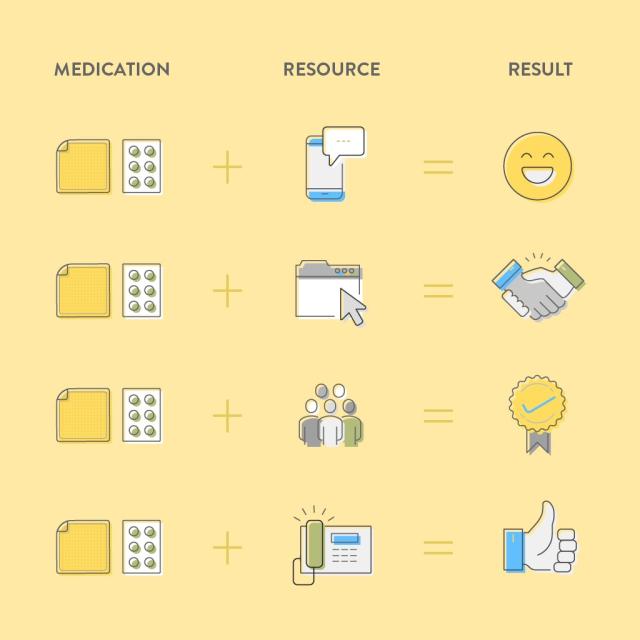Medications can make it easier to quit smoking by reducing cravings and withdrawal symptoms.
Many former smokers find that using these medications for a couple of months helped them quit. But they are just one type of tool, not a magic bullet. Follow instructions carefully to get the most benefit.
What medications and NRT products are available?
There are 7 FDA approved medications (5 NRT products: patch, lozenge, gum, nasal spray, and inhaler; and 2 prescription medications: Bupropion and Varenicline). Your pharmacist or doctor can help you choose which is best for you.
Nicotine Replacement Therapy
NRT works by giving you a small, controlled amount of nicotine, which is the main addictive substance in cigarettes and other tobacco products. NRT doesn't have any of the other dangerous chemicals found in cigarettes. This small amount of nicotine helps satisfy cravings for nicotine and reduces your urge to smoke. Some smokers have mild to moderate side effects. However, research shows that NRT is safe and works. NRT is available over the counter and by prescription.
Non-Nicotine Prescription Medications
There are two common prescription medications that help smokers quit: Bupropion SR and Varenicline. You'll need a prescription from your doctor to get these medications. Many insurance plans cover quit smoking medications. Check with your insurance plan to see if you are covered.
Bupropion SR
Bupropion SR (e.g., Wellbutrin), is a medicine without nicotine. It may help with withdrawal symptoms and the urge to smoke. This medicine may not be right for pregnant women, people who have seizures, people who have eating disorders, or heavy alcohol users.
Varenicline
You may have heard about a recall of varenicline. If you are currently using varenicline and have concerns, talk to your doctor or pharmacist about what is best for you. Visit FDA’s webpage for more information about the recall.
Varenicline (e.g., Chantix) does not have nicotine. This drug may help you quit by improving withdrawal symptoms and making nicotine from cigarettes less effective if you start smoking again. This medicine may not be right for people with kidney problems and women who are pregnant‚ planning to become pregnant‚ or are breastfeeding.
Ask your doctor‚ dentist‚ or pharmacist if these medicines are right for you. Always use them as prescribed or as listed on the packaging.
Combination therapy
For some smokers, doctors may suggest two NRTs or combining an NRT with a prescription medication. For example, your doctor may tell you to combine a long acting NRT, like the patch, with a short-acting NRT, like nicotine gum, when you need extra help to control cravings.
Learn more about what NRT products or medications might be right for you.
$ = less than $150 | $$ = $151–$299 | $$$ = $300 and more.
|
Patch (e.g., Nicoderm CQ®)
|
The nicotine patch is placed on the skin once a day and supplies a steady amount of nicotine to the body, which helps reduce withdrawal symptoms and the urges to smoke. The dose is gradually reduced over time.
|
Free to $$
Cost may be free or significantly reduced through insurance, health plans, and clinics. Some states offer free or low cost nicotine patches to eligible adults through 1-800-QUIT-NOW (1-800-784-8669).
|
No prescription needed.
Can find at local pharmacy
|
Common side effects include mild skin rashes and irritation where the patch is located, dizziness, headache, nausea, vomiting, and diarrhea. Many of the side effects can be avoided by using the patch as directed.
|
|
Gum (e.g., Nicorette®)
|
Nicotine gum is chewed 10-12 times per day to release nicotine that gets absorbed through the lining of the mouth, helping to reduce withdrawal symptoms and urges to smoke. The dose is gradually reduced over time.
|
Free to $$$
Cost may be free or significantly reduced through insurance, health plans, and clinics. Some states offer free or low cost nicotine gum to eligible adults through 1-800-QUIT-NOW (1-800-784-8669).
|
No prescription needed.
Can find at local pharmacy
|
Common side effects include bad taste from the gum, tingling feeling on the tongue when chewing, hiccups, upset stomach, nausea, heartburn, and jaw pain caused by chewing. Side effects can be avoided by using the gum as directed.
|
|
Lozenge (e.g., Nicorette®)
|
Nicotine lozenges look like hard candy and are placed in the mouth where it slowly dissolves, releasing nicotine which enters the body through the lining of the mouth, helping to reduce withdrawal symptoms and urges to smoke. The nicotine dose is gradually reduced over time. Most smokers need at least 8 lozenges a day to receive benefits.
|
Free to $$$
Cost may be free or significantly reduced through insurance, health plans, and clinics. Some states offer free or low cost nicotine lozenges to eligible adults through 1-800-QUIT-NOW (1-800-784-8669).
|
No prescription needed.
Can find at local pharmacy
|
Common side effects include soreness of teeth and gums, indigestion, and irritated throat.
|
|
Nasal Spray (e.g., Nicotrol®)
|
Nicotine is sprayed into the nostrils but not inhaled. It raises your blood nicotine levels more quickly than other NRTs. It helps to reduce nicotine withdrawal symptoms and urges to smoke. It is usually prescribed to heavily addicted smokers and is more likely to be addictive than other forms of NRT. Most smokers average 14-15 sprays per day.
|
$$ to $$$
Cost may be significantly reduced through insurance, health plans, and clinics.
|
Needs a prescription.
See your doctor for more information.
|
Common side effects include sneezing, coughing, and watering eyes.
|
|
Inhaler (e.g., Nicotrol®)
|
The inhaler is held between your fingers and you puff on it like a cigarette. The puffing is done frequently to ensure the adequate amount of nicotine is inhaled. When you puff, the inhaler turns nicotine into a vapor that is absorbed in your mouth. It helps to reduce nicotine withdrawal symptoms and urges to smoke.
|
Free to $$$
Cost may be free or significantly reduced through insurance, health plans, and clinics.
|
Needs a prescription.
See your doctor for more information.
|
Common side effects include throat irritation, mouth irritation, and coughing.
|
|
Bupropion (e.g., Wellbutrin® or Zyban®)
|
Bupropion is found in pill form. It helps to reduce nicotine withdrawal symptoms and the urge to smoke. It contains no nicotine.
|
Free to $$$
Cost may be free or significantly reduced through insurance, health plans, and clinics. Depending on your state, 1-800-QUIT-NOW (1-800-784-8669) may also offer free or low-cost Bupropion pills to eligible adults.
|
Needs a prescription.
See your doctor for more information.
|
Common side effects include dry mouth and difficulty sleeping.
|
|
Varenicline (e.g., Chantix®)
|
Varenicline is found in pill form. It eases nicotine withdrawal symptoms and blocks the effects of nicotine from cigarettes if you start smoking again. It contains no nicotine.
|
$$ to $$$
Cost may be significantly reduced through insurance, health plans, and clinics.
|
Needs a prescription.
See your doctor for more information.
|
Common side effects include nausea, change in dreaming, constipation, gas, and vomiting. Some people may experience rare side effects including mood swings, depression, and suicidal thoughts. If you experience any of these rare side effects, contact your doctor right away.
|
|
Patch (e.g., Nicoderm CQ®)
|
| The nicotine patch is placed on the skin once a day and supplies a steady amount of nicotine to the body, which helps reduce withdrawal symptoms and the urges to smoke. The dose is gradually reduced over time. |
| Free to $$
Cost may be free or significantly reduced through insurance, health plans, and clinics. Some states offer free or low cost nicotine patches to eligible adults through 1-800-QUIT-NOW (1-800-784-8669).
|
| No prescription needed.
Can find at local pharmacy
|
| Common side effects include mild skin rashes and irritation where the patch is located, dizziness, headache, nausea, vomiting, and diarrhea. Many of the side effects can be avoided by using the patch as directed. |
|
Gum (e.g., Nicorette®)
|
| Nicotine gum is chewed 10-12 times per day to release nicotine that gets absorbed through the lining of the mouth, helping to reduce withdrawal symptoms and urges to smoke. The dose is gradually reduced over time. |
| Free to $$$
Cost may be free or significantly reduced through insurance, health plans, and clinics. Some states offer free or low cost nicotine gum to eligible adults through 1-800-QUIT-NOW (1-800-784-8669).
|
| No prescription needed.
Can find at local pharmacy
|
| Common side effects include bad taste from the gum, tingling feeling on the tongue when chewing, hiccups, upset stomach, nausea, heartburn, and jaw pain caused by chewing. Side effects can be avoided by using the gum as directed. |
|
Lozenge (e.g., Nicorette®)
|
| Nicotine lozenges look like hard candy and are placed in the mouth where it slowly dissolves, releasing nicotine which enters the body through the lining of the mouth, helping to reduce withdrawal symptoms and urges to smoke. The nicotine dose is gradually reduced over time. Most smokers need at least 8 lozenges a day to receive benefits. |
| Free to $$$
Cost may be free or significantly reduced through insurance, health plans, and clinics. Some states offer free or low cost nicotine lozenges to eligible adults through 1-800-QUIT-NOW (1-800-784-8669).
|
| No prescription needed.
Can find at local pharmacy
|
| Common side effects include soreness of teeth and gums, indigestion, and irritated throat. |
|
Nasal Spray (e.g., Nicotrol®)
|
| Nicotine is sprayed into the nostrils but not inhaled. It raises your blood nicotine levels more quickly than other NRTs. It helps to reduce nicotine withdrawal symptoms and urges to smoke. It is usually prescribed to heavily addicted smokers and is more likely to be addictive than other forms of NRT. Most smokers average 14-15 sprays per day. |
| $$ to $$$
Cost may be significantly reduced through insurance, health plans, and clinics.
|
| Needs a prescription.
See your doctor for more information.
|
| Common side effects include sneezing, coughing, and watering eyes. |
|
Inhaler (e.g., Nicotrol®)
|
| The inhaler is held between your fingers and you puff on it like a cigarette. The puffing is done frequently to ensure the adequate amount of nicotine is inhaled. When you puff, the inhaler turns nicotine into a vapor that is absorbed in your mouth. It helps to reduce nicotine withdrawal symptoms and urges to smoke. |
| Free to $$$
Cost may be free or significantly reduced through insurance, health plans, and clinics.
|
| Needs a prescription.
See your doctor for more information.
|
| Common side effects include throat irritation, mouth irritation, and coughing. |
|
Bupropion (e.g., Wellbutrin® or Zyban®)
|
| Bupropion is found in pill form. It helps to reduce nicotine withdrawal symptoms and the urge to smoke. It contains no nicotine. |
| Free to $$$
Bupropion is found in pill form. It helps to reduce nicotine withdrawal symptoms and the urge to smoke. It contains no nicotine.
|
| Needs a prescription.
See your doctor for more information.
|
| Common side effects include dry mouth and difficulty sleeping. |
|
Varenicline (e.g., Chantix®)
|
| Varenicline is found in pill form. It eases nicotine withdrawal symptoms and blocks the effects of nicotine from cigarettes if you start smoking again. It contains no nicotine. |
| Free to $$$
Cost may be significantly reduced through insurance, health plans, and clinics.
|
| Needs a prescription.
See your doctor for more information.
|
| Common side effects include nausea, change in dreaming, constipation, gas, and vomiting. Some people may experience rare side effects including mood swings, depression, and suicidal thoughts. If you experience any of these rare side effects, contact your doctor right away. |
Under the direction of a doctor, NRT can be safely used by people with diabetes or high blood pressure, and does not increase the risk of heart attacks. It is also important to note that the nicotine in NRT is at a level that is unlikely to interact with other medications. Talk to your doctor to learn if NRT is the right choice for your quit plan.
Under the Affordable Care Act, many of these treatments must be covered by insurance. For many smokers, this includes counseling and medication at no cost. For details about Medicare and Medicaid, please visit the external websites. You can also talk to your insurance provider about your benefits.








